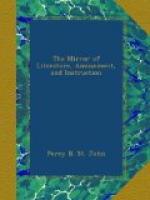* * * * *
FOSTER CHILDREN.
There still remains in the Hebrides, though it is passing fast away, the custom of fosterage. A laird, a man of wealth and eminence, sends his child, either male or female, to a tacksman or tenant to be fostered. It is not always his own tenant, but some distant friend that obtains this honour; for an honour such a trust is very reasonably thought. The terms of fosterage seem to vary in different islands. In Mull, the father sends with his child a certain number of cows, to which the same number is added by the fosterer. The father appropriates a proportionable extent of ground, without rent, for their pasturage. If every cow bring a calf, half belongs to the fosterer, and half to the child; but if there be only one calf between two cows, it is the child’s; and when the child returns to the parents, it is accompanied with all the cows given, both by the father and by the fosterer, with half of the increase of the stock by propagation. These beasts are considered as a portion, and called Macalive cattle, &c.
Children continue with the fosterer perhaps six years; and cannot, where this is the practice, be considered as burdensome. The fosterer, if he gives four cows, receives likewise four, and has, while the child continues with him, grass for eight without rent, with half the calves, and all the milk, for which he pays only four cows, when he dismisses his dalt, for that is the name for a fostered child.—Johnson’s Journey.
* * * * *
THE IRISH PEOPLE.
Holinshed, speaking of the Irish, observes:—“Greedy of praise they be, and fearful of dishonour; and to this end they esteem their poets, who write Irish learnedly, and pen their sonnets heroical, for the which they are bountifully rewarded; if not, they send out libels in dispraise, whereof the lords and gentlemen stand in great awe. They love tenderly their foster children, and bequeath to them a child’s fortune, whereby they nourish sure friendship,—so




